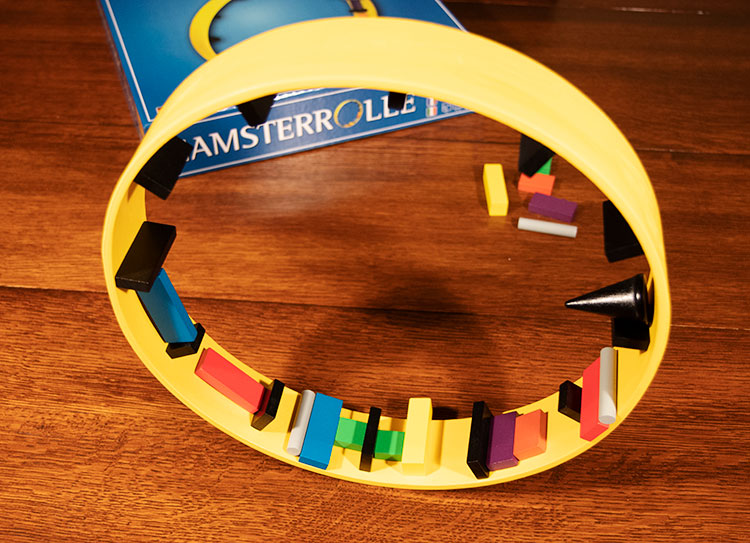 Sometimes all you need for a fun game is a great idea. If it’s a concept that players haven’t seen before or that’s never been tried, you are already ahead of the curve. Donald X. Vaccarino had that with Dominion when he came up with the idea for a deck builder.
Sometimes all you need for a fun game is a great idea. If it’s a concept that players haven’t seen before or that’s never been tried, you are already ahead of the curve. Donald X. Vaccarino had that with Dominion when he came up with the idea for a deck builder.
And now we have Hamster Roll. A dexterity game where designer Jacques Zeimet clearly drew some inspiration from a furry animal’s exercise furnishing. There is no questioning that Hamster Roll is unique, but a clever idea only takes you so far, as the gameplay must also hold up. Let’s find out if it does.
Gameplay Overview:
Playing a game of Hamster Roll is just as easy as you’d expect. The goal of the game is to get rid of all seven of your pieces. On your turn, you must place one of your wooden pieces inside the giant wheel.
Placement rules are simple: The piece must be in the active segment (where the previous player played), or in one of the two segments further along the wheel in the chosen direction. Also, two blocks of the same color cannot be placed in the same segment. Any pieces that fall out of the wheel on your turn are taken back into your pile. And that’s it!

Game Experience:
Hamster Roll looks both equally goofy and intriguing on your tabletop. On one hand, you are playing a game on a giant hamster wheel. Yet on the other, there is no question that people walking by are going to stop and wonder just what exactly you are doing. And thanks to Hamster Roll’s accessible nature, just about any of those people can jump in and play with minimal instruction because the rules for Hamster Roll are ridiculously simple. Place a piece and hope it doesn’t cause others to fall off.

Part of the fun of Hamster Roll comes from the tension that builds. As pieces get placed into the wheel, you can watch it slowly rotate after a player’s turn. This feeling builds as pieces get closer and closer to the top of the wheel, just begging to fall out. These are the moments that make Hamster Roll enjoyable.
You can also play as mean or as nice as you like in this game. Decisions will need to be made for not only where to place a piece, but how. If you want to try and screw over the next player, you can choose to place your block lengthwise instead of sideways. This gives them a lot less space to play and might even push them up to the next segment earlier than they might hope to be. Yes, surprisingly, there is a bit of strategy in Hamster Roll.
The wheel also rolls forward as you place them (physics people), you’ll occasionally need to slide it back into the middle of the table. Or let it roll off the edge, you do you. Unless you have some precariously placed pieces, it shouldn’t be an issue. The rules also say that you have 30 seconds to place your piece or you must drop it where it is. I’m not sure how much we care about this rule as rarely did it feel like someone was taking a long time. But I guess it’s good its there if you have an AP prone group.
The main downside of Hamster Roll is that there isn’t a ton of depth here. The game probably could also have used a bit more diversity in the pieces, as all except one are rectangular blocks. Overall there isn’t a ton of variety from game to game, so this one is best pulled off the shelf randomly, rather than consistently.
Final Thoughts:
Hamster Roll is definitely one of the more unique dexterity games out there. While it’s not the deepest of games, it is a ton of fun. It passed that test pretty quickly in our group as most of the people that played my copy ended up buying one of their own. If that’s not an endorsement of the game, I don’t know what is.
Final Score: 3.5 Stars – An easy-to-learn dexterity game with a solid table presence.
 Hits:
Hits:
• Good amount of tension in the game
• Unique gameplay that’s easy to learn
• Quick playtime makes it easy to play a few in a row
Misses:
• Could use more variety in the pieces






















